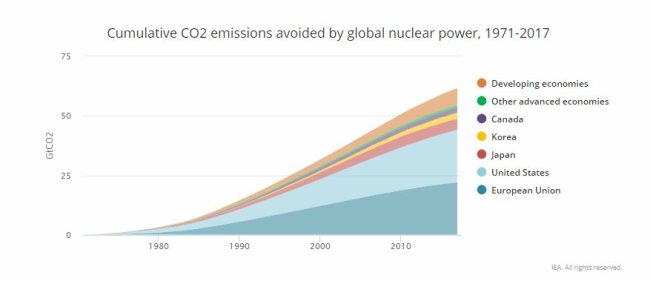World Nuclear Association – Press release “Nuclear generation helps ensure access to affordable, reliable, sustainable and modern energy for all. By offering an alternative to fossil fuels, which produce air pollution, nuclear helps ensure healthy lives and well-being. By allowing rapid decarbonisation of electricity nuclear helps take urgent action on climate change. Nuclear desalination can help ensure access to clean water, and by supplying affordable, reliable 24/7 electricity nuclear contributes to sustainable economic growth.” These comments were made by Agneta Rising, World Nuclear Association Director General, during the United Nations Economic Commission for Europe’s (UNECE) Ministerial Conference of the Ninth International Forum on Energy for Sustainable Development. The forum is bringing together a broad range of UN and international energy organizations to examine energy transition and decarbonization. Rising welcomed the fact that such a wide range of low carbon energy technologies, including nuclear energy, were being discussed under the auspices of the UN. Rising said “Substituting energy supplied by fossil fuels with electricity generated from nuclear energy and other low carbon sources is a practical proposition to deliver a clean energy transition.” The number of influential bodies acknowledging the importance of nuclear energy in the climate and energy challenge is growing. In October the Intergovernmental Panel on Climate Change (IPCC) reported to the UN on the impacts of climate change and what would be needed to limit temperature rises to 1.5°C. They concluded that achieving the 1.5°C goal will require global greenhouse gas emissions to start reducing almost immediately. Nuclear generation increases by an average of around 2.5 times by 2050 in the 89 mitigation scenarios considered by the IPCC. Notes for the Editor The Ninth International Forum on Energy for Sustainable Development is being co-organized by the Government of Ukraine and the five UN Regional Commissions in partnership with United Nations Development Programme (UNDP), United Nations Industrial Development Organization (UNIDO), United Nations Institute for Training and Research (UNITAR), UN Environment, The World Bank, International Energy Agency (IEA), International Renewable Energy Agency (IRENA), International Atomic Energy Agency (IAEA), Global Environment Facility (GEF), Organization for Security and Co-operation in Europe (OSCE), European Commission, International Energy Charter, International Energy Forum (IEF), the Copenhagen Centre on Energy Efficiency, International Institute for Applied Systems Analysis (IIASA), Fraunhofer Institute for Environmental Safety, and Energy Technology UMSICHT, Pacific Northwest National Laboratory (PNNL), Dartmouth College, Climate Action Network (CAN), Oil and Gas Climate Initiative (OGCI) and World Nuclear Association (WNA). The Forum’s goal is to provide a unique opportunity for policymakers and experts from various parts of the energy sector to reflect on the implications of the fast-paced energy transition that has become the new normal, review the activities to date and to make further progress towards meeting the UN’s Sustainable Development Goals (SDGs).





